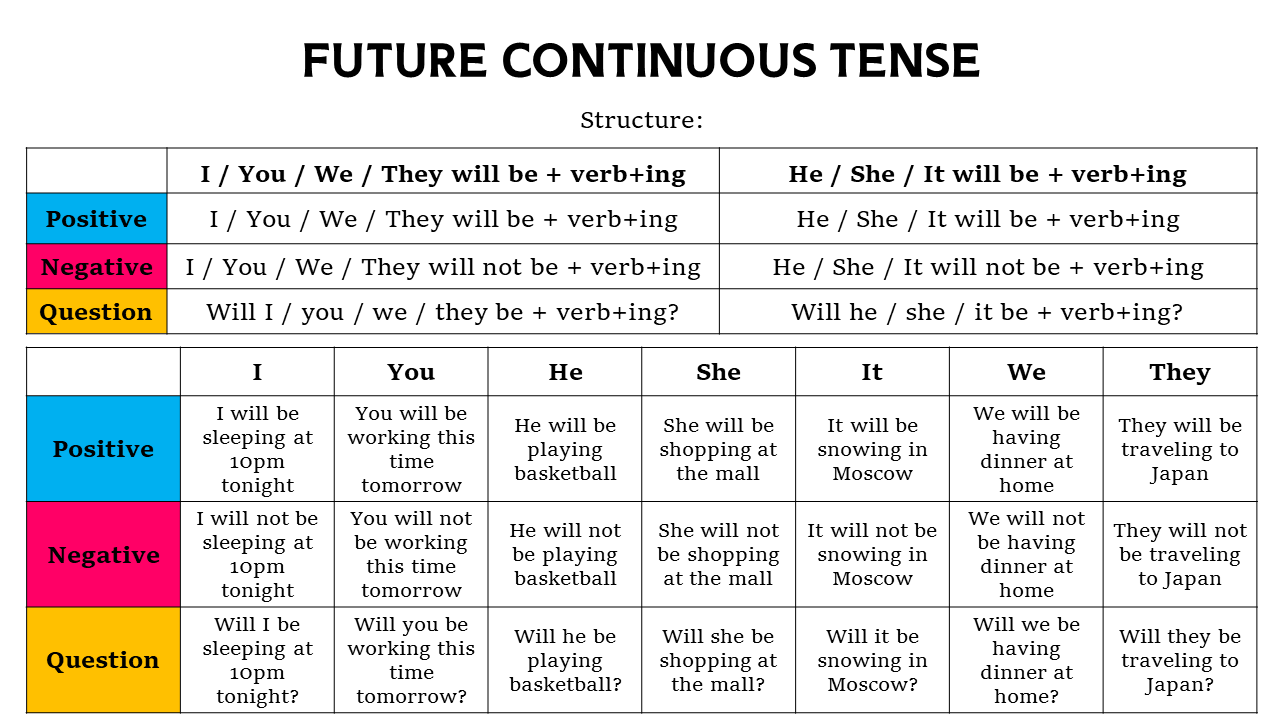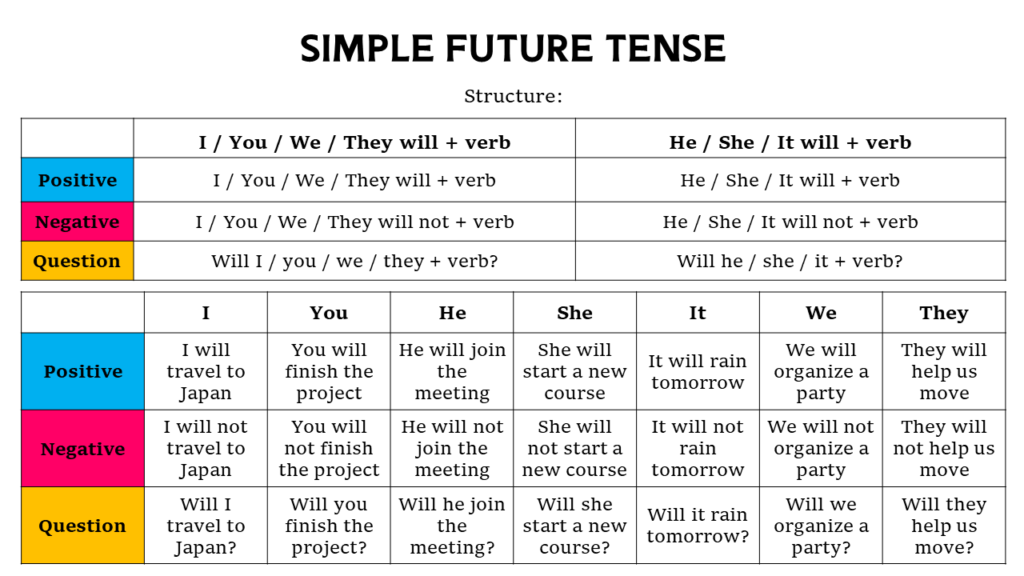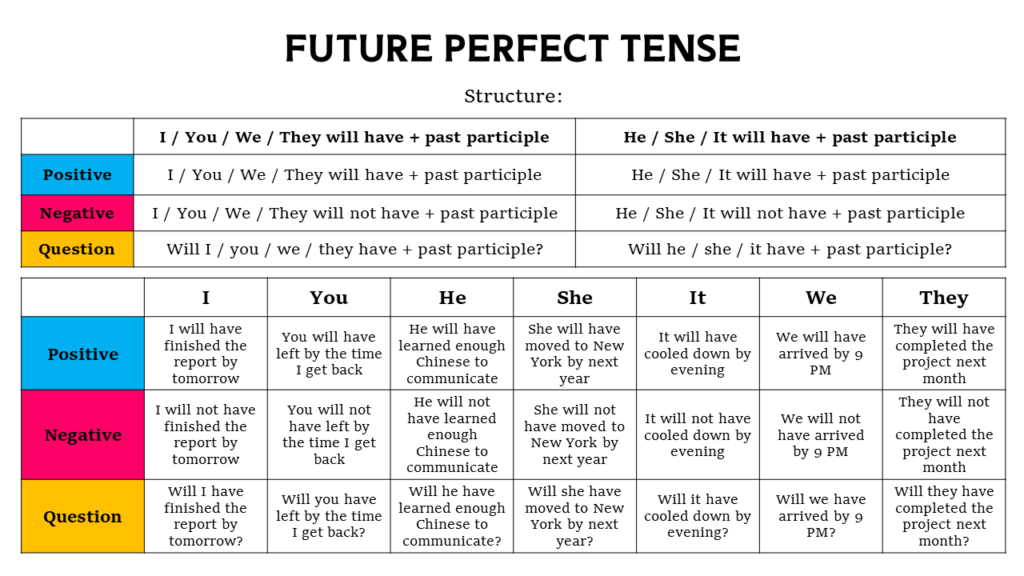The future continuous tense, a fascinating aspect of English grammar, invites us to envisage actions unfolding over time in the future. It’s a lens through which we view ongoing or prolonged activities set to occur, providing a dynamic and vivid way to express future plans, events, or actions in progress at a specific moment.
Definition
The future continuous tense is used to describe actions that will be ongoing at a specific time in the future. It paints a picture of activities that will unfold over a period, highlighting their continuous nature and setting the stage for future narratives.
Formula/Structure
Formulating sentences in the future continuous tense involves the subject, followed by “will be” and the verb ending in -ing. This structure elegantly captures the essence of actions extending into the future. Here’s the breakdown:
- Affirmative: Subject + will be + verb(-ing)
- Example: “I will be traveling to Italy next summer.”
- Negative: Subject + will not (won’t) be + verb(-ing)
- Example: “She won’t be using her phone during the lecture.”
- Interrogative: Will + subject + be + verb(-ing)?
- Example: “Will you be joining us for dinner?”
Rules with Examples
- Consistent use of ‘will be’: Unlike other tenses, “will be” is used for all subjects. “They will be staying at the grand hotel.”
- Expressing future actions at a specific time: Use this tense for actions that will be happening at a future moment. “At 10 AM tomorrow, I will be giving a presentation.”
- Describing parallel future actions: It can also describe multiple actions happening simultaneously in the future. “This time next week, I will be sitting on the beach, sipping a cool drink.”
How to Make Future Continuous Tense?
1. Positive Future Continuous Tense
Express actions that will be in progress at a specific future time.
2. Negative Future Continuous Tense
Denote that an action will not be happening at a particular future time.
3. Interrogative Future Continuous Tense
Ask about actions that will or will not be in progress at a future moment.
Examples of Future Continuous Tense
Examples of Positive Future Continuous Tense
- “This time next year, I will be studying abroad.”
- “Tomorrow at 9 PM, they will be watching the fireworks.”
- “He will be working all weekend.”
- “We will be driving through the countryside on our holiday.”
- “At noon, she will be having lunch with her colleagues.”
- “The team will be practicing in the field in the morning.”
- “You will be waiting for the results this time tomorrow.”
- “The conference will be starting at 10 o’clock sharp.”
- “I will be thinking of you during my journey.”
- “They will be celebrating their anniversary at that time.”
Examples of Negative Future Continuous Tense
- “I won’t be going to the party tonight.”
- “She won’t be using her car next week.”
- “We won’t be staying late at the office tomorrow.”
- “He won’t be attending the meeting on Friday.”
- “They won’t be playing in the tournament.”
- “You won’t be needing your umbrella; it’s not going to rain.”
- “The shop won’t be opening early on Sunday.”
- “I won’t be making any major decisions until next month.”
- “She won’t be watching TV tonight; she has to study.”
- “We won’t be flying direct; there’s a layover.”
Examples of Interrogative Future Continuous Tense
- “Will you be using this room tomorrow morning?”
- “Will he be joining us for the trip?”
- “Will they be staying at the same hotel?”
- “Will she be studying at the library this afternoon?”
- “Will we be meeting in the same conference room?”
- “Will it be raining all day tomorrow?”
- “Will the children be sleeping when we arrive?”
- “Will you be driving to work next week?”
- “Will the project be continuing into the next quarter?”
- “Will I be seeing you at the event?”

Exercise of Future Continuous Tense With Answers
Questions
- This time tomorrow, I (to fly) to New York.
- At 8 o’clock tonight, she (not to study); she (to watch) a movie.
- (you to wait) for me when my train arrives?
- He (to work) late tonight, so he won’t join us.
- What (they to do) this weekend?
- We (not to use) the car next week because it’s in for repair.
- At this time next year, she (to attend) university.
- (it to snow) when we get there?
- Why (he not to participate) in the discussion tomorrow?
- They (to renovate) their house at this time next month.
Answers
- This time tomorrow, I will be flying to New York.
- At 8 o’clock tonight, she won’t be studying; she will be watching a movie.
- Will you be waiting for me when my train arrives?
- He will be working late tonight, so he won’t join us.
- What will they be doing this weekend?
- We won’t be using the car next week because it’s in for repair.
- At this time next year, she will be attending university.
- Will it be snowing when we get there?
- Why won’t he be participating in the discussion tomorrow?
- They will be renovating their house at this time next month.
The future continuous tense offers a vibrant tapestry for expressing ongoing future actions, infusing our language with a sense of motion and continuity. By mastering this tense, you can effectively convey the unfolding of future events, painting vivid pictures of what lies ahead.


